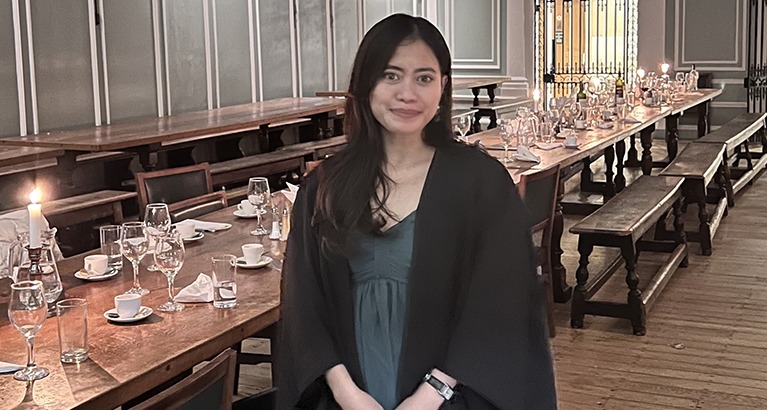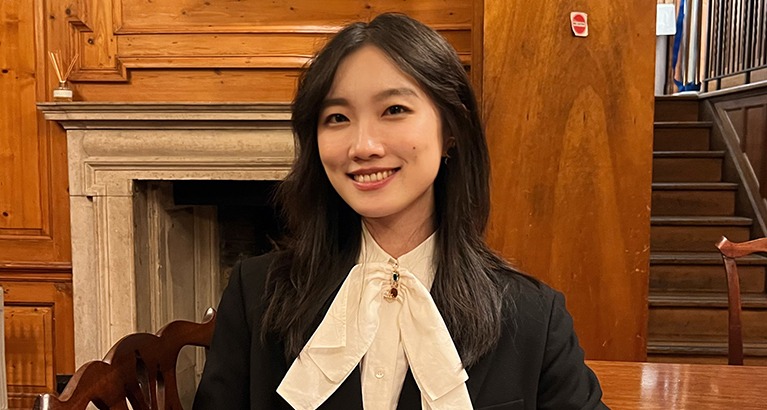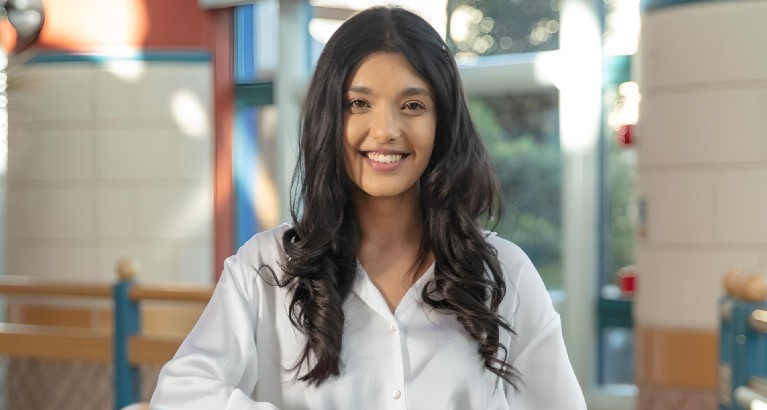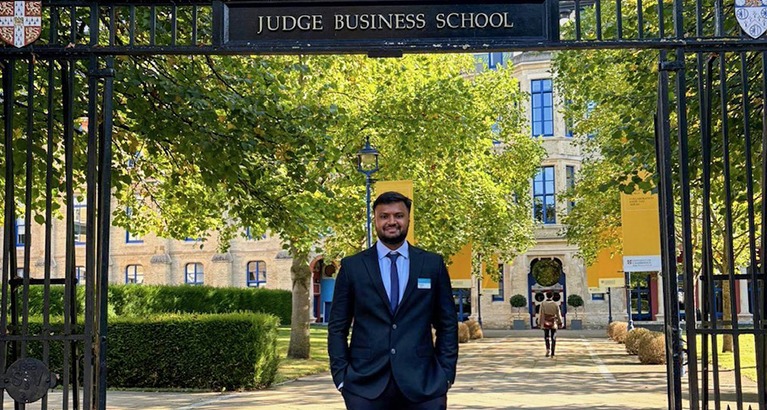The Financial Times recently reported that Indonesia is on track to become the 6 largest economy in the world by 2027. As a young Indonesian, I perceive this projection as an aspiration, challenge, and responsibility. With 270 million people, tremendous natural resources, and an expanding middle class, human capital development is essential to achieving this ambitious goal.
Reflecting on my roots, I grew up in Borneo, an island far from Indonesia’s main archipelago, where my passion for learning was nurtured. My academic achievements resulted in the opportunity to study at the country’s top university, supported by a government scholarship. After graduation, I joined one of Indonesia’s largest banks to sharpen my foundational skills in business and banking. However, recognising the privilege afforded to me by the government, I felt compelled to contribute to Indonesia’s economy.
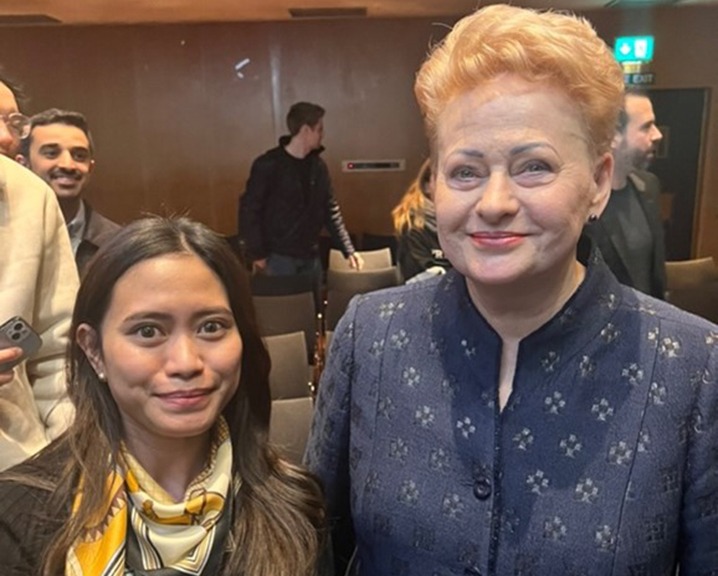
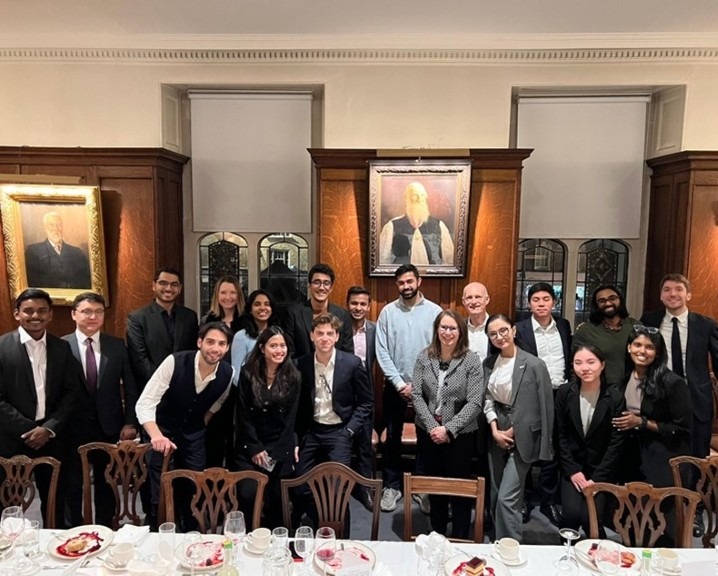
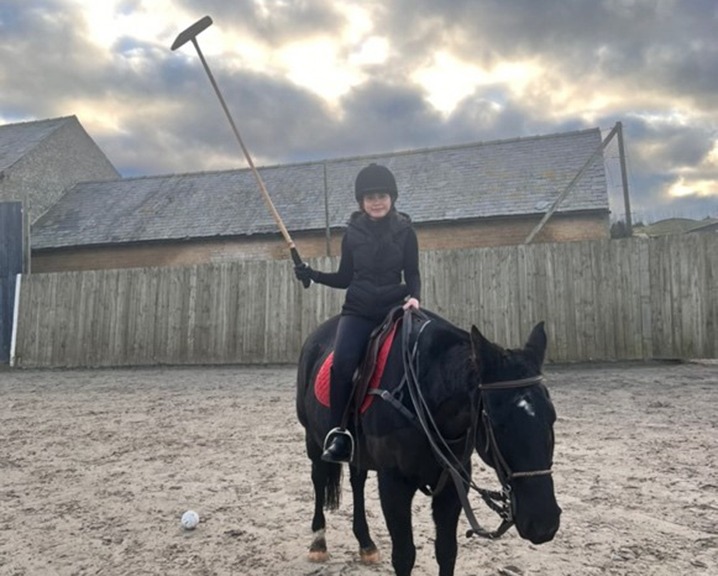
The path to Cambridge
My professional journey began when I joined Pertamina, Indonesia’s national energy company, through its management trainee program. As the only Indonesian Fortune 500 company, Pertamina plays a pivotal role in the national economy, creating value through its assets, both domestically and internationally. Over the last decade, my experience has spanned operational, strategic, and financial divisions.
One of my most impactful roles was serving as an advisor to the Board of Commissioners. In this capacity, I focused on strategic initiatives to transform Pertamina into a holding company. I was involved in overseeing investments in energy transition and enhancing the company performance, which included formulating integrated asset management strategies valued at US$35 billion.
Embracing the ethos that ‘opportunity comes twice,’ Pertamina sponsored my pursuit of higher education. I choose the Cambridge Judge Business School at the University of Cambridge for its esteemed Master of Finance programme, which is ranked second globally by the Financial Times (2022). Stepping into the Business School is like walking into a realm where history and modernity converge. Nestled in the heart of one of the world’s oldest and most prestigious universities, this institution has already left an indelible mark on me, one that’s challenging to encapsulate but transformative in every sense.
Historical elegance and modern excellence
The architecture of the Cambridge Judge Business School, a blend of ancient splendour and contemporary design, stands as a metaphor for its educational approach: deeply rooted in tradition yet forward-looking and innovative. Walking through the hall of St Catherine’s College, where I matriculated, one feels the weight of centuries of academic achievement, a constant reminder of the enduring legacy we’re part of.
A curriculum that challenges and inspires
The world-class curriculum is not just about acquiring knowledge. It’s about challenging our understanding of the world. It pushes us to think critically, question conventionally, and explore the frontiers of business innovation. Each course is a journey in itself, guided by leading academics and industry experts who bring a wealth of experience and insights. Integral to this journey are the group projects that require us to collaborate closely with peers from diverse backgrounds. These projects are not only a test of our ability to apply theoretical knowledge in practical settings but also enhance our skills in teamwork, communication, and problem-solving.
Diversity: a melting pot of ideas and cultures
At the heart of my transformative experience at the Cambridge Judge Business School, lies its incredibly diverse community, a vibrant mosaic of global perspectives, cultures, and academic disciplines. Beyond the enriching cultural exchanges and the broadening of academic horizons, Cambridge’s distinction as the hub of Silicon Fen adds an unparalleled dimension of innovation and entrepreneurship to the learning environment. This proximity to a leading technology and business cluster has facilitated encounters with cutting-edge research and startups, weaving science, technology, and business into the fabric of our daily discussions.
The international friendships I’ve forged, spanning from business to science and beyond, have not only enriched my cultural understanding but also exposed me to diverse academic fields, fostering a unique environment of mutual learning and respect. This rich tapestry of international, interdisciplinary, and innovative interactions at Cambridge has been pivotal in shaping my approach to global perspective, emphasising the importance of inclusivity, open-mindedness, and viewing challenges through a multitude of perspectives.
Beyond academics: shaping ethical leaders
But perhaps the most profound aspect of my education journey here has been the emphasis on ethical leadership and social responsibility. The Business School doesn’t just aspire to create business leaders. It aims to cultivate leaders who are mindful of their impact on society and the environment.
One of the most notable aspects of the programme is the weekly City Speaker Series, where prominent global leaders will share their insights and experience with us. After the talk, some of us will have dinner with the guest speaker, where the conversation can continue in a more relaxed way, and topics might extend from daily life to the world’s most pressing problems. Another highlight for me was having the chance to attend a fireside chat with the former president of Lithuania, which was organised by the King’s College Entrepreneur Lab.
Opportunities to grow and excel
The University of Cambridge and the Business School offers various clubs and student-led societies where students can meet individuals who shares the same interest. Knowing that I bring a wealth of knowledge and experience in the energy sector, I wanted to find a way to contribute to the University as well. My role as Co-President in the Energy and Environment SIG (Student Interest Group) and Leader of the Cambridge University Energy Network have been crucial for my leadership development, transcending academic learning. This hands-on experience has pushed me to master the art of strategic planning, consensus-building, and empathetic communication. We recently arranged a speaker session with strategy consultant Roland Berger to share his insight about Carbon Capture Usage and Storage (CCUS).
I also had the chance to challenge myself in another way when I joined Cambridge University Polo Club. Playing polo has refined my physical resilience, strategic agility, and teamwork, demanding a high level of co-ordination and trust both with horses and teammates. These experiences, in tandem, have broadened my cultural perspective and enhanced my leadership qualities, equipping me with the tools to face the dynamic challenges of global business and sustainability.
Reflecting on the journey so far
Reflecting on my educational journey from Indonesia to Cambridge, it is apparent this experience has been essential in forming my perspective and technical competence. In a community that celebrates diversity and innovation, I’ve gained invaluable insights and developed a global perspective.
Taking on leadership roles within University societies has refined my strategic and empathetic leadership skills, preparing me for the challenges ahead. As I look towards contributing to Indonesia’s promising future, I am grateful for the rich tapestry of experiences and the robust network of international friendships I’ve built. Realising that the Lent term will end soon, this journey has not just been about personal achievements and friendship but also about preparing to contribute effectively to my country’s journey on the global stage.

About the blog author
Juita is a Corporate Strategist in the Energy Sector. She has 10 years of experience spanning the upstream to downstream energy sector, both for oil and gas and renewable energy. Prior to joining the MFin, she worked for Pertamina, Indonesia’s national energy company.
Juita completed her Bachelor’s degree in Business and Management at Gadjah Mada University in Indonesia. After completing the MFin, Juita hopes to continue her work at Pertamina, focussing on renewable projects to accelerate energy transition in Indonesia and Southeast Asia.
Related content
The Financial Times recently reported that Indonesia is on track to become the 6 largest economy in the world by 2027.
Related articles
Student and alumni news
Lessons from leaders: insights from the City Speaker Series
The City Speaker Series is one of the highlights of the Cambridge MFin programme, providing students with the opportunity to meet and network with leading finance practitioners. Speakers are experts in their fields, often working at the cutting edge of applied finance. Here Ruiyan Hou (MFin 2024) shares some of her personal highlights from the City Speaker Series and the Cambridge MFin programme.
Student and alumni news
Cambridge MFin life: mind, muscle and markets
Sharu Iyer (MFin 2024) shares a typical day on the Cambridge Master of Finance degree programme.
Student and alumni news
Books, boats and business: my journey to Cambridge Judge Business School
As Michaelmas term draws to a close, Master of Finance student Sayam Sanjib Deb looks back on his first few weeks at Cambridge.


